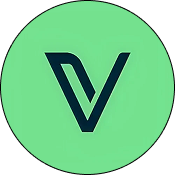Navigating the vast landscape of blockchain technology requires more than just surface-level understanding; it demands an in-depth look at how different protocols serve diverse needs. VeChain and dYdX exemplify this diversity—each built with distinct goals, technical architectures, and ecosystems, yet both pivotal in shaping the future of decentralized applications. Whether you're interested in supply chain management or decentralized finance, understanding their core differences helps investors and enthusiasts make informed decisions. This comparison explores their technical foundations, use cases, scalability, and community engagement to reveal which blockchain aligns best with your specific needs.
Short on time? Jump to VeChain vs dYdX Comparison
Understanding VeChain and dYdX ?
VeChain operates as a layer 1 public blockchain focused on enterprise adoption, especially in supply chain management and product authenticity verification. Its unique Proof of Authority (PoA) consensus mechanism, driven by trusted authority masternodes, ensures a balance between security, speed, and decentralization tailored for business use cases. Launched in 2018, VeChain has achieved notable milestones, including extensive real-world deployments like Walmart China, demonstrating its practical application in traceability and logistics.
In contrast, dYdX is a decentralized protocol specializing in derivatives trading, built initially as an Ethereum-based platform before migrating to a Layer 2 solution with Starkware in 2021. Its core strength lies in enabling permissionless, high-leverage trading with features like perpetual contracts, liquidity pools, and community governance. With a focus on scalability and user empowerment, dYdX has rapidly grown, with billions in trading volume and a vibrant community actively shaping its future through governance proposals.
While VeChain emphasizes enterprise-grade solutions for supply chain and product verification, dYdX caters to traders seeking permissionless access to advanced financial instruments. Both platforms leverage innovative technical solutions—VeChain with its PoA consensus and enterprise focus, and dYdX with Layer 2 scalability and DeFi features—that highlight their tailored approaches to blockchain utility.
Understanding these fundamental differences sets the stage for a detailed comparison of their technical architectures, use cases, scalability, and community engagement, providing clarity for users interested in leveraging blockchain technology for specific applications.
Key Differences Between VeChain and dYdX
Consensus Mechanism
- VeChain: VeChain employs a Proof of Authority (PoA) consensus with 101 trusted Authority Masternodes. This model favors speed, security, and enterprise trust, as nodes are identified and held accountable, making it ideal for business applications requiring stability and compliance.
- dYdX: dYdX utilizes a Layer 2 scaling solution built on Starkware, leveraging zk-Rollups technology for high throughput and low latency. Its consensus is embedded within governance and protocol upgrades, focusing on scalability and permissionless participation in trading.
Primary Use Cases
- VeChain: VeChain is primarily designed for supply chain management, product traceability, and authenticity verification, enabling businesses to track goods from origin to consumer, reduce counterfeiting, and ensure regulatory compliance.
- dYdX: dYdX is centered around decentralized derivatives trading, offering perpetual contracts, margin trading, and advanced trading automation, with a strong emphasis on liquidity, user empowerment, and permissionless access.
Scalability & Performance
- VeChain: VeChain produces a new block approximately every 10 seconds, with low energy consumption—only 0.04% of other blockchains—making it suitable for large-scale enterprise deployment with high throughput needs.
- dYdX: dYdX's Layer 2 architecture enables it to handle thousands of transactions per second, supporting complex financial instruments and high leverage trading with minimal latency and gas costs.
Governance & Community
- VeChain: VeChain’s governance involves stakeholders and enterprise partners, with protocol upgrades and technical developments driven by partnerships and research, emphasizing stability and enterprise needs.
- dYdX: dYdX features decentralized governance with token-based voting, allowing community members to propose and decide on protocol upgrades, fostering an active and engaged user base.
Energy Efficiency
- VeChain: VeChain’s PoA consensus is highly energy-efficient, consuming just a fraction of the energy used by traditional proof-of-work networks, aligning with sustainability goals.
- dYdX: dYdX's Layer 2 solution reduces energy consumption significantly compared to on-chain proof-of-work systems, supporting eco-friendly decentralized finance activities.
VeChain vs dYdX Comparison
| Feature | ✅ VeChain | ✅ dYdX |
|---|---|---|
| Consensus Mechanism | Proof of Authority (PoA) with 101 trusted nodes | Layer 2 zk-Rollups technology with governance-based updates |
| Main Use Cases | Supply chain, product authenticity, traceability | Decentralized derivatives trading, liquidity pools |
| Transaction Speed | Block every 10 seconds | Supports thousands of transactions per second via Layer 2 |
| Community Governance | Stakeholder-driven, enterprise partnerships | Token-based, community-involved governance |
| Energy Consumption | Extremely low, 0.04% of other chains | Layer 2 reduces energy use significantly |
Ideal For
Choose VeChain: Businesses seeking a secure, efficient, and scalable blockchain for supply chain and product verification.
Choose dYdX: Traders and DeFi enthusiasts looking for permissionless, high-leverage trading with scalable infrastructure.
Conclusion: VeChain vs dYdX
VeChain and dYdX serve distinct yet equally vital roles within the blockchain ecosystem. VeChain’s focus on enterprise solutions, supply chain transparency, and sustainability makes it an ideal choice for businesses aiming to digitize and authenticate their products efficiently. Its PoA consensus ensures stability, security, and regulatory compliance, which are critical for real-world applications. Conversely, dYdX’s emphasis on decentralized finance, advanced trading features, and high scalability positions it as a powerhouse for traders and developers seeking permissionless, high-performance financial instruments. Its Layer 2 architecture addresses the scalability bottleneck faced by many blockchain platforms, enabling massive trading volumes with minimal energy footprint.
Choosing between VeChain and dYdX ultimately hinges on your specific needs—whether you prioritize enterprise-grade supply chain solutions or cutting-edge DeFi trading capabilities. Both platforms exemplify how tailored blockchain architecture can meet diverse demands, pushing the boundaries of what decentralized technology can achieve. As blockchain adoption accelerates, understanding these core differences will empower users to leverage the right platform for their goals, whether in commerce or finance.






